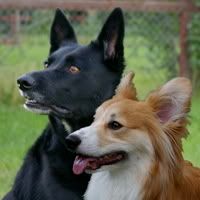I used to work as a tech assistant at a vet clinic, and I brought Shippo in to have blood drawn. Well, he struggled and yelped, and he had NEVER reacted like this at the vet before, but they tensed up while holding him and scared him really bad. Since they were restraining his head, his airway got cut off when he pulled back, so it caused him to snort as he tried to breathe.
Early on while I was working there, I got a feeling the techs there were all extremely dominance and punishment-based because they would actually STRIKE a dog they thought was misbehaving. It's a good thing I was in the room, because the tech who was working on my dog told the person restraining him to "punish him NOW because he's GROWLING at me!"
I had to ARGUE with her about it, because I'd had Shippo for TWO YEARS at this point and could tell by now when he was growling or snorting (he snorts frequently like a little piggy if he's stressed or excited), and this lady was trying to tell ME that I didn't know my OWN DOG. Thankfully, she backed down and I was able to prevent him from being wrongfully punished, but WOW! This got me thinking to my self, "Boy, I wonder how many vet employees have abused my dogs when I wasn't around to stop it."
From now on, I will be very cautious about who I let handle my pets behind closed doors. I will ask them about their handling methods first, and ask if they might allow me to restrain my own pet (though I ONLY recommend this to people who are experienced at restraint). It's important that your dog is getting as positive an experience as possible while at the vet, because it can effect other aspects of their training.
